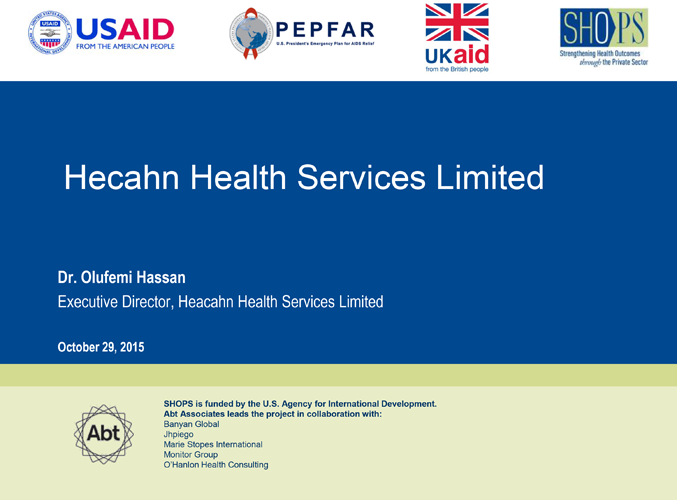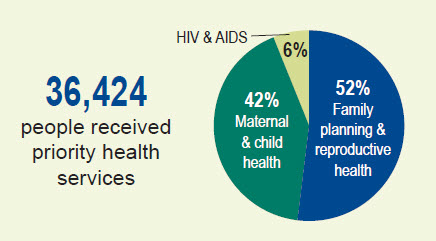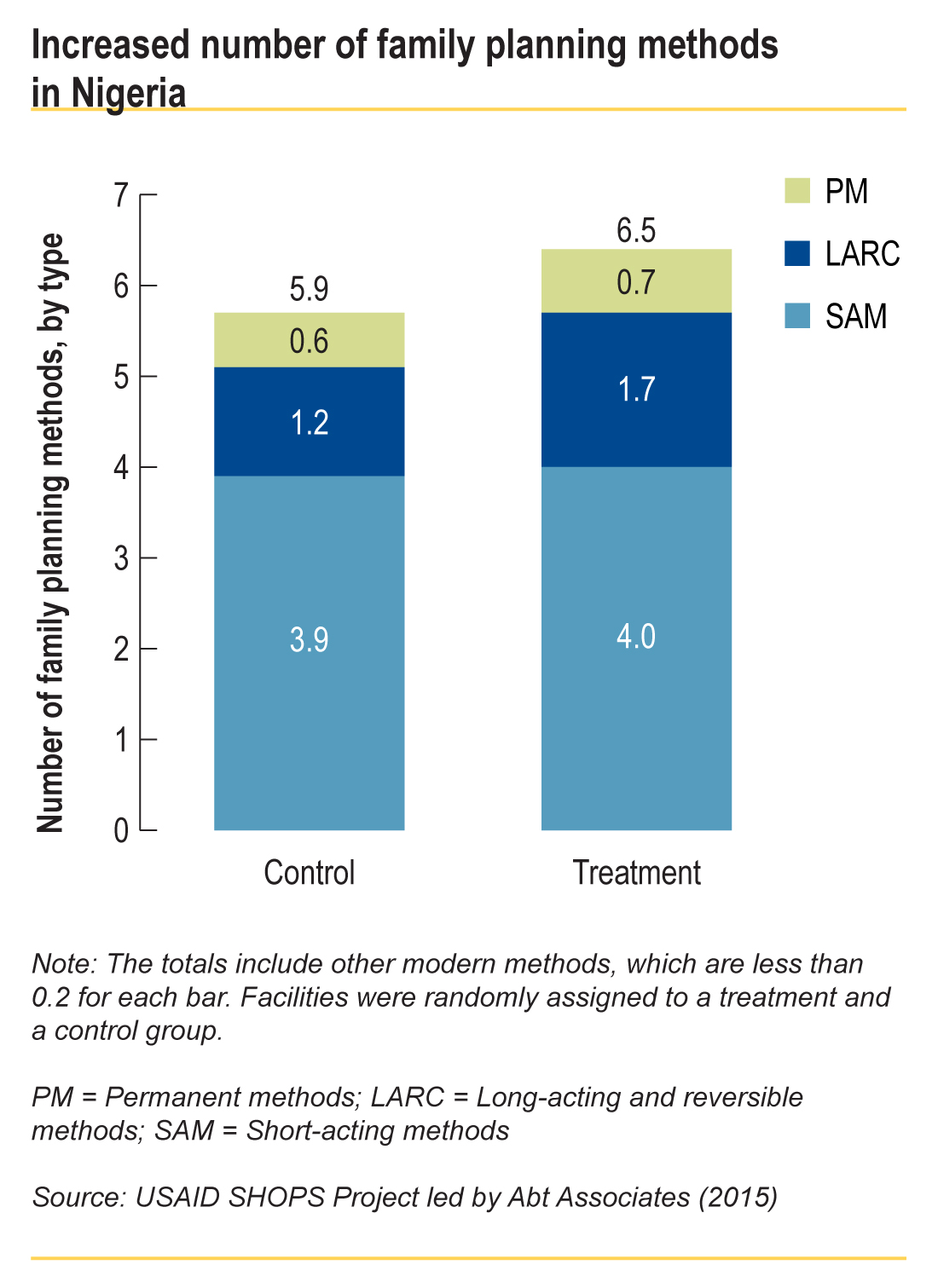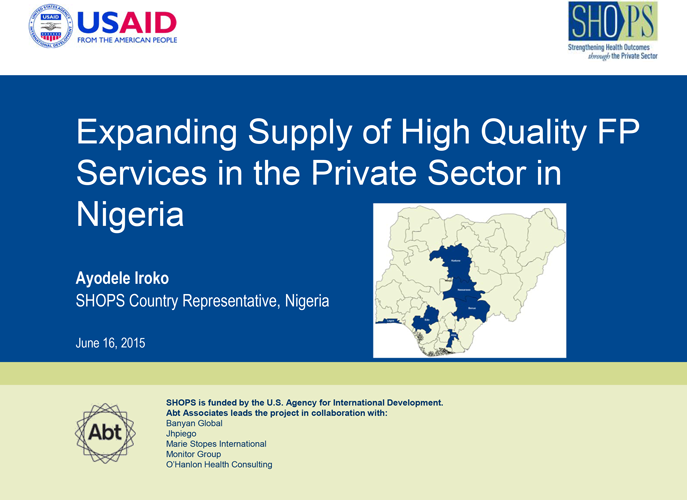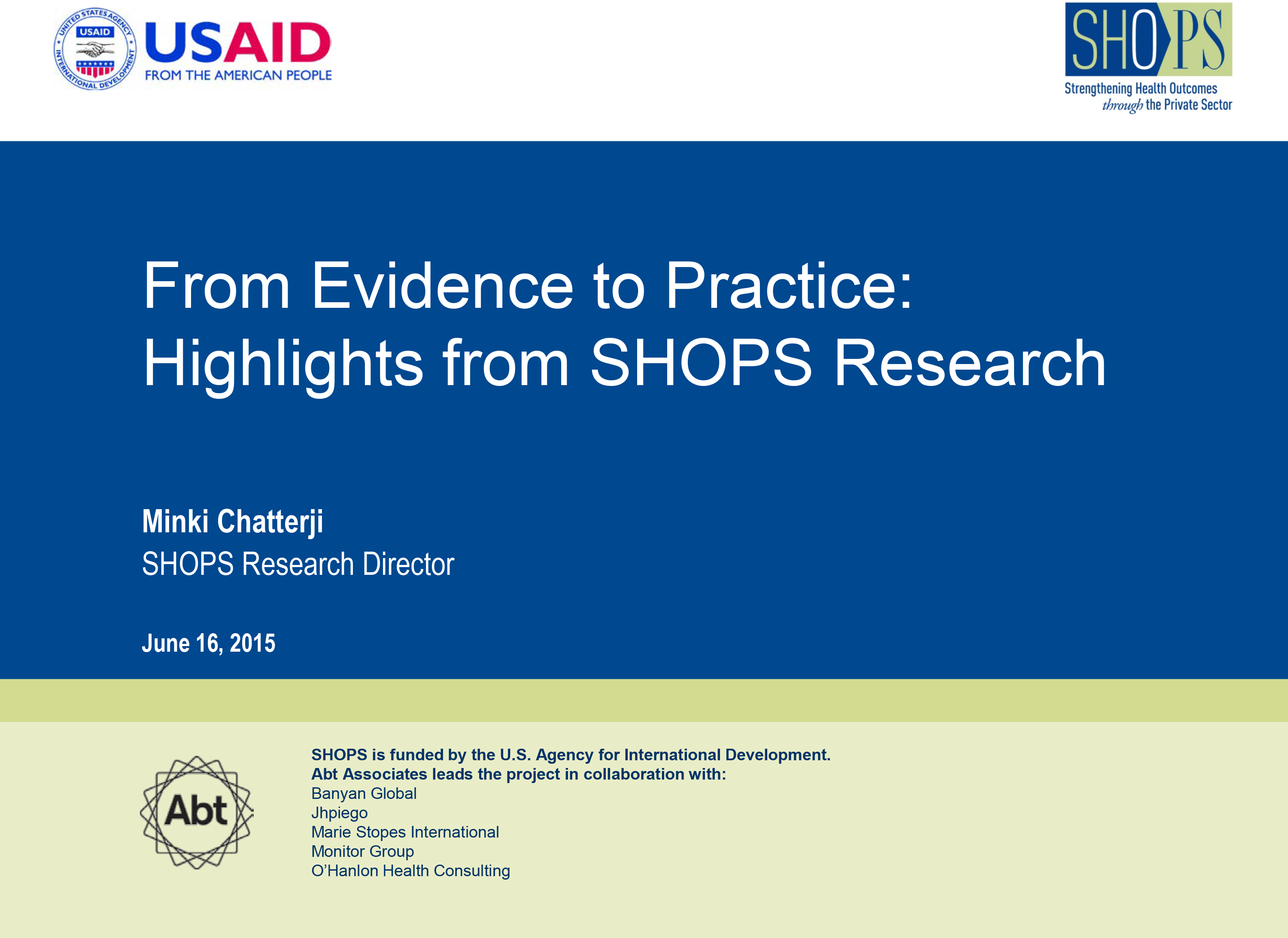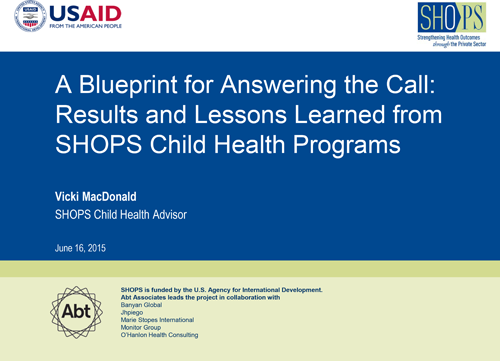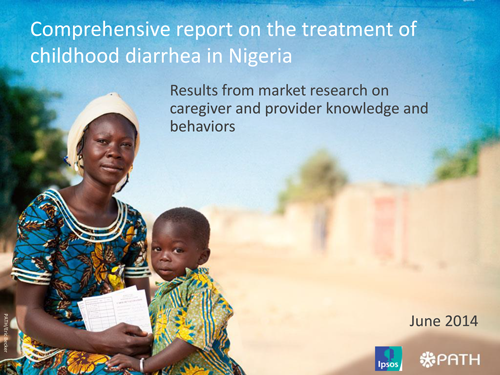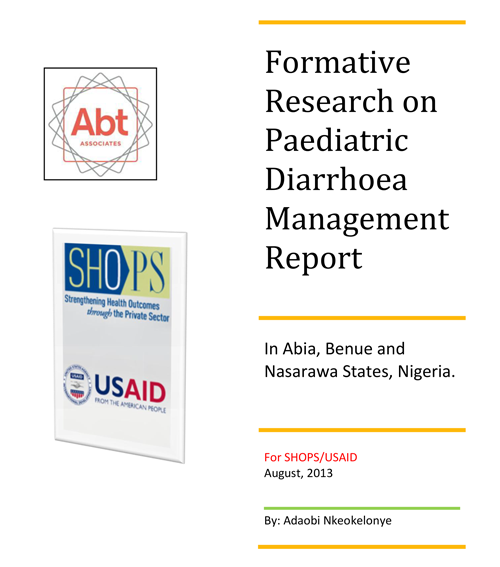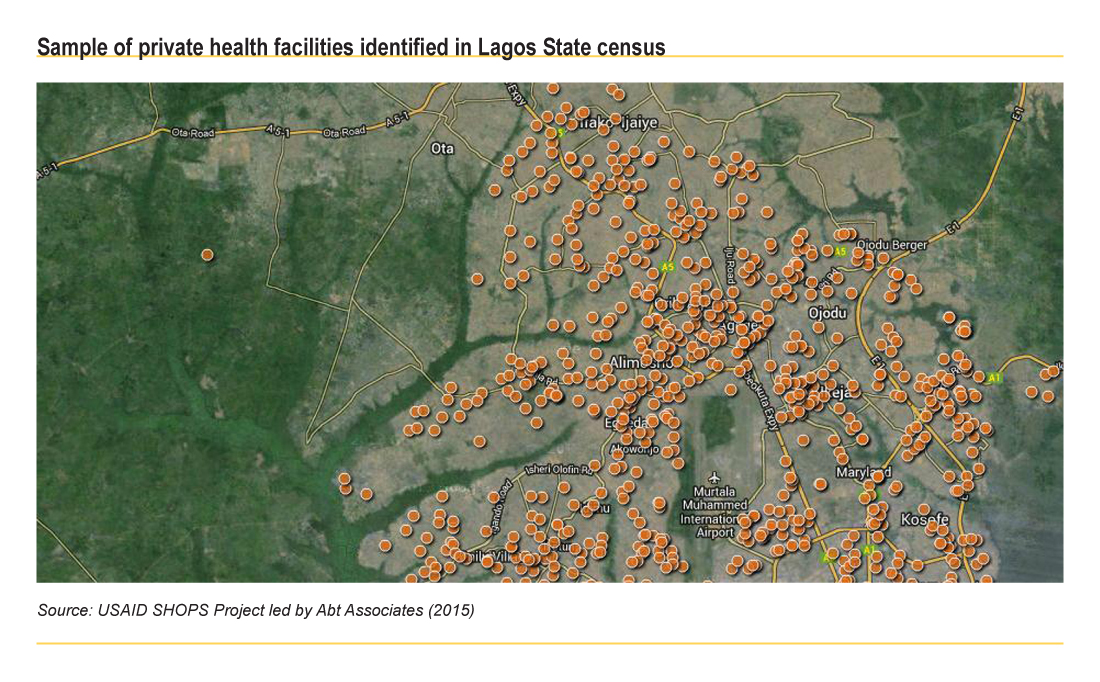
Resource Library

HANSHEP Health Enterprise Fund: Innovative Solutions for the Poor
The SHOPS project launched the HANSHEP Health Enterprise Fund to identify innovative and replicable solutions that address critical health challenges in sub-Saharan Africa—high rates of maternal and child mortality, unmet need for modern family planning methods, and lack of access to HIV and AIDS testing, care, and treatment services. Through a competitive process, the fund selected 16 early-stage enterprises to support in Ethiopia, Kenya, and Nigeria. This video describes how the fund provides grants and technical assistance, and facilitates connections with investors, creating a base for entrepreneurs to scale their businesses and reach more people with affordable health services and products.
Resource Type : Video
Country : Ethiopia, Kenya, Nigeria
Year : 2015-11-02T12:00:00
Language :
Project : SHOPS

Resource Library
Hecahn Health Services Limited
This presentation provides an overview of Hecahn Health Services Limited, a HANSHEP Health Enterprise Fund grantee. It was given at the end-of-project event for the fund, held in October 2015.
Resource Type : Presentation
Country : Nigeria
Year : 2015-11-02T00:00:00
Language : English
Project : SHOPS

Resource Library
HANSHEP Health Enterprise Fund: Innovating Health Care for the Poor
In 2013, the SHOPS project developed the HANSHEP Health Enterprise Fund (HHEF) to identify innovative and replicable private sector solutions that address critical health challenges in sub-Saharan Africa. The fund offers early-stage enterprises grant financing, technical assistance, and connections to partners and investors. Through a competitive process, the fund selected 16 grantees in Ethiopia, Kenya, and Nigeria. In this publication, SHOPS reviews barriers the poor face, highlights results the fund has achieved in just two years, and features some of the stories behind the ambitious and visionary work of the awardees.
Resource Type : Brief
Country : Ethiopia, Kenya, Nigeria
Year : 2015-09-22T00:00:00
Language : English
Project : SHOPS

Resource Library
Impact of Offering Family Planning and Business Trainings to Private Facilities in Nigeria
Evidence shows that offering family planning and business trainings to private providers has a positive and significant effect on the number of contraceptive methods, particularly long-acting and reversible methods, offered in health facilities and the overall quality of family planning services.
Resource Type : Brief
Country : Nigeria
Year : 2015-08-24T00:00:00
Language : English
Project : SHOPS

Resource Library
Expanding Supply of High Quality FP Services in the Private Sector in Nigeria
This presentation examines how SHOPS improved the supply of and generated demand for family planning services in Nigeria's private sector. It was presented by Ayodele Iroko at the SHOPS end-of-project event on June 16, 2015.
Resource Type : Presentation
Country : Nigeria
Year : 2015-07-06T00:00:00
Language : English
Project : SHOPS

Resource Library
From Evidence to Practice: Highlights from SHOPS Research
This presentation examines highlights from SHOPS's 50 studies conducted in family planning and reproductive health, HIV and AIDS, and maternal and child health . It was presented by Minki Chatterji at the SHOPS end-of-project event on June 16, 2015.
Resource Type : Presentation
Country : Ghana, Kenya, Madagascar, Nigeria, Uganda
Year : 2015-07-02T00:00:00
Language : English
Project : SHOPS

Resource Library
A Blueprint for Answering the Call: Results and Lessons Learned from SHOPS Child Health Programs
This presentation examines results and lessons learned from SHOPS work in child health and diarrhea management. It was presented by Vicki MacDonald at the SHOPS end-of-project event on June 16, 2015.
Resource Type : Presentation
Country : Benin, Ghana, India, Kenya, Madagascar, Nigeria, Uganda
Year : 2015-07-02T00:00:00
Language : English
Project : SHOPS

Resource Library
Comprehensive Report on the Treatment of Childhood Diarrhea in Nigeria
This presentation summarizes the results from market research conducted with healthcare providers and caregivers of children under five in Nigeria to gain a deeper understanding of knowledge and behavior related to the treatment of diarrhea in children younger than 5 years of age. Findings revealed that while ORS use is high overall, messaging should reinforce that it be used first and in the right amounts. To target groups most likely to die from diarrhea, implementation strategy and communication messaging needs to reflect behaviors and perceptions of non-users. Messaging should incorporate local terminology into messaging: for example, “oral drip,” “stooling.” Both caregivers AND providers need to be educated about diarrhea management (anti-motility recommendation is highest among doctors). There is room to improve provider knowledge on the purpose of the products as well as the need to give instructions to mothers on volume of ORS. Programs should craft messaging to address confusion between ORS and HSSS. Why pay for a product when the ingredients are at home? Make clear what the added value is of packaged ORS. Finally, PPMVs could be an important group for messaging as they are seen as a trustworthy source, especially in rural areas. In addition, as they provide treatments on credit, they are not just focused on profit, but being a useful source of treatment.
Resource Type :
Country : Nigeria
Year : 2014-06-01T00:00:00
Language : English
Project : SHOPS

Resource Library
Formative Research on Paediatric Diarrhoea Management Report
The SHOPS project conducted formative research to determine the diarrhea management knowledge, attitudes and practices of private health providers in Nasarawa, Benue and Abia States. SHOPS conducted 41 in-depth interviews were conducted with selected community pharmacists and patent proprietary medical vendors (PPMVs) in the project states. Two written focus group sessions were conducted for pharmacists in Benue and Abia states. Results showed that while knowledge of ORS was high, awareness of ORS plus zinc as the new recommended treatment was low and there is widespread indiscriminate use of antibiotics as a treatment for diarrhea. Caregivers come with their own prescriptions, and children are often the emissary procuring drugs from PPMVs and CP’s especially in rural areas. The existence of an open-market pattern in drug sales conflicts seriously with professional pharmaceutical practices, especially in Aba state. Overall socio-cultural, traditional and economic factors play a significant role in influencing the treatment of childhood diarrhea in Nigeria.
Resource Type :
Country : Nigeria
Year : 2013-08-01T00:00:00
Language : English
Project : SHOPS

Resource Library
Nigeria Program Profile
The SHOPS project began working in Nigeria in 2010 and aims to strengthen private sector family planning, reproductive health, and maternal and child health services. This profile presents the goals, components, results, and the following lessons learned from the SHOPS program in Nigeria:
- Focused provider training, combined with demand creation, is a powerful tool for encouraging providers to introduce new clinical methods.
- Use of SMS technology offers a cost effective way of reinforcing training and increasing efficiencies in commodity logistics.
- Microfinance institutions, supported by DCA credit guarantees, offer critical opportunities for smaller providers to access credit and expand their services.
Resource Type :
Country : Nigeria
Year : 2015-06-16T00:00:00
Language : English
Project : SHOPS
Pagination
- Previous page
- Page 6
- Next page


